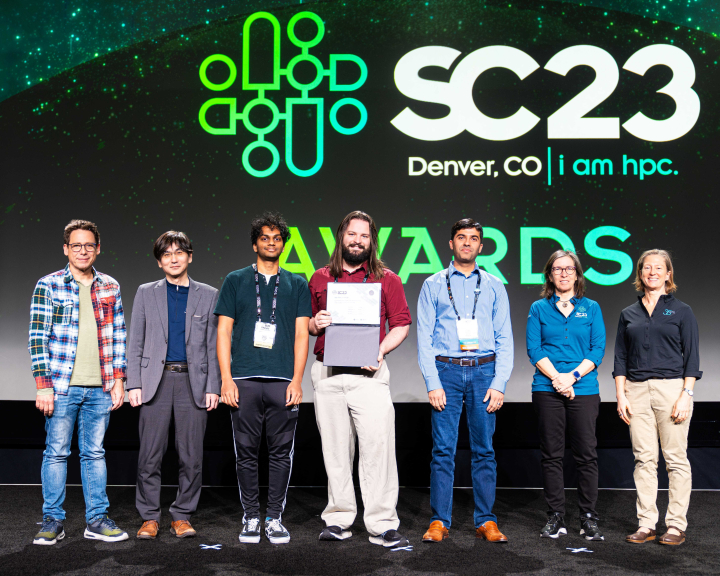PSSG Students Win Best Research Poster Award at SC23 Conference
A team from the Parallel Software and Systems Group (PSSG) at the University of Maryland received the Best Research Poster Award for their work on the performance portability of parallel programming models on graphics processing units (GPUs) at the International Conference for High-Performance Computing, Networking, Storage, and Analysis (SC23), held in Denver, Colorado, from November 12 to 17, 2023. Their poster, "Evaluating Performance Portability of GPU Programming Models,” made a notable contribution by examining various programming models and observing their overall efficiency.
UMD Computer Science Associate Professor Abhinav Bhatele, Ph.D. student Joshua Davis, graduate student Pranav Sivaraman and undergraduate student Isaac Minn worked on the innovative project.
The SC23 conference, with over 14,000 participants, featured 71 research posters from institutions worldwide.
"It's incredibly exciting to receive such strong community support and recognition for our work on performance portability,” Davis said. “This problem is gaining traction, especially with the deployment of new systems from different vendors. The timing seems right, and we've received valuable feedback, sparking potential collaborations and new ideas."
A central challenge to achieving performance portability in high-performance computing stems from the widespread adoption of GPUs as the primary computational engines in contemporary HPC systems. These GPUs, produced by various manufacturers, endorse unique programming methodologies, posing a formidable obstacle for software developers seeking consistent performance across multiple platforms.
To tackle this issue, the HPC research community devised specialized programming models akin to distinct programming languages to offer a unified interface for programming GPUs from various vendors, like NVIDIA, AMD and Intel. These programming models hold the potential to attain performance portability, allowing a single code to operate seamlessly across diverse hardware platforms, regardless of the vendor.
Davis compares these programming models, examining their efficiency in enabling performance portability when applied to proxy applications—smaller codes representing the performance characteristics of larger scientific applications. After implementing these proxy applications in each programming model, Davis and his team executed them on top-tier HPC systems, including some of the world’s fastest supercomputers operated by the Department of Energy, to evaluate their performance portability.
“We observed significant differences in performance portability, with some models outperforming others,” Davis said. “Our ongoing project aims to delve deeper into the reasons behind these differences. This poster serves as an initial step in starting a discussion and providing guidance to developers and scientists who use these tools, making it easier for them to harness supercomputers and top-tier resources."
The team's future work will further explore the intricacies of performance portability challenges and their root causes, with a goal of advancing the field of high-performance computing and facilitating broader accessibility and usability for scientists and developers.
"We aim to delve beyond the differences in performance portability and explore the 'why' behind them,” Davis shared. “Understanding the underlying reasons, such as how certain model features interact with usage, provides valuable insights. It allows users to determine the importance of these features and find ways to work around them, making the research more broadly applicable. We also want to assess these models' ease of use and productivity, examining factors like code readability and modification. This research direction is challenging, but we plan to collaborate with experts in HCI to explore the relationship between the system and the user, a direction I'm personally invested in."
The SC 2023 Best Poster award marks the beginning of an ongoing project with the potential to impact the field significantly.
"As the diversity and complexity of HPC hardware increases, it becomes imperative to identify ways to help programmers be as productive as possible,” Bhatele said. “This research explores attaining the best performance across various hardware by developing single-source implementations of a parallel code. SC23 is the premier conference in HPC, and it's great that Josh, Pranav and Isaac have been recognized for their excellent work in this area."
Story by Samuel Malede Zewdu, CS Communications
The Department welcomes comments, suggestions and corrections. Send email to editor [-at-] cs [dot] umd [dot] edu.
